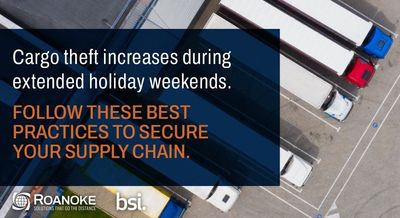October 24, 2023 | Cargo Insurance
Clearing the Hurdles: How to Successfully Navigate Project Cargo Risks

Written by Andrew Johnson & featured in the American Journal of Transportation
Imagine you have spent six months planning and bidding the transportation of a large piece of equipment. The shipment travels from origin to port and is loaded onto an awaiting vessel for the ocean voyage to the destination port. The equipment is offloaded to a railcar at the destination port, surveyed, and tied down with no apparent damages. Upon arrival at the rail siding, you are notified of paint transfer and un-determined damage to the equipment. Your first step is to notify the cargo owner so they aren’t surprised. Next comes a scramble to review the terms and conditions of all the contractors and the language of all signed agreements. And of course a notification has to be sent to the insurance company to start the claims process. If navigating through this maze sounds familiar, you aren’t alone. Welcome to the intricacies of project cargo risk management.
The Complexities of Project Cargo Risk
Project cargo can be a complicated risk to insure, and there are a number of factors that a transportation intermediary should consider when seeking coverage. Master Service Agreements (MSA) are often integral to project cargo, and these MSA’s may include complex contract language, sometimes requiring predetermined loss amounts in the form of liquidated damages and consequential damages. These terms are difficult risks to insure. Project cargo moves often involve unconventional modes of transportation with multiple connecting conveyances. Shipments may require millions or tens of millions of dollars to execute, and these costs may be part of one move or accrue over the course of many moves. Unconventional modes of transit, complex contract terms, and the high value of the cargo are exacerbated by the current hard insurance market. It falls to the transportation intermediary to find the best way to navigate the risks of insuring project cargo.
The First Hurdle – Contract Risk
The contract, or purchase order, is typically the first item to come across the transportation intermediary’s desk for both new and repeat business. Before signing a MSA or contract, the transportation intermediary should consult with professionals who understand the dangers inherent in contract language. A trusted insurance broker with experience in the logistics industry and transportation attorneys are highly recommended. It is critical to understand what risks are being assumed in any contract and to properly evaluate what risks you can transfer and what risks will be carried by the transportation intermediary in the contract language. Specific clauses that transportation intermediaries should be particularly alert for include Hold Harmless, Liquidated Damages or Consequential Damages, and Penalties.
Some contract risk can be transferred from the transportation intermediary to an insurance provider via a cargo legal liability policy, but typically contractual liability is excluded as it is above standard terms and conditions found in legal liability coverage. Therefore, the contract terms must be agreed to by underwriters in writing and premium must be paid. One instance where this is typically occurs is when the shipper has a separate cargo insurance policy in place and desires to have their cargo insurance deductible paid in case of damage. This is called the insurance of a deductible layer or a self-insured retention layer. These layers are tough to place in the insurance market as it is a contract requirement.
Sub-Contractor Insurance – Due Diligence is Essential
A practical risk management action that every transportation intermediary should take is to verify the insurance of all sub-contractors and look for gaps in coverage. It’s not enough to know that the sub-contractor has a policy on file. Are the policy limits adequate to cover the risk of a high value project cargo move? What are the coverages that the sub-contractor has in place, and what exclusions in their policies might impact a potential loss? These are questions that need to be answered before the transportation intermediary signs a sub-contractor, not after a loss occurs. Determining that appropriate coverage is in place with adequate limits may involve reading the actual policy language of the contractor. It is highly recommended that an experienced insurance broker or legal counsel reviews policy language with the transportation intermediary.
The transportation intermediary may need to have the sub-contractor obtain additional insurance coverage or increase the limits on their existing policies. All sub-contractor insurance policy limits should also be provided to the cargo owner’s and transportation intermediary’s insurers to ensure there are no issues or language that would limit subrogation in case of damage. Subrogation is the insurance company’s right to legally pursue parties responsible for loss or damage after they pay a claim. Waivers of subrogation may impact the amount of coverage an insurance company will offer.
Reasonable Care and Proper Claims Procedures
Project cargo moves are by their nature highly complex operations with multiple stages. The transportation intermediary needs to align the right professionals at each stage of transport to ensure that all plans are adhered to. This includes having surveyors at loading, destination, and trans-shipment points for high value cargo to ensure proper handling in accordance with engineering specifications and securement requirements. Depending on the mode of transport, this may be an ocean, barge, rail or truck surveyor who has expertise in different securement methods and can interpret engineering and technical documents. If plans are not followed or surveys are not properly enacted and documented, insurance coverage could be compromised.
In the event a loss occurs, it is important for the transportation intermediary to understand how to properly handle the claim. The first notification should be to the insurance company, referred to as the insurer. The insurer will assess and ensure that the claim can be handled, and a claims agent will send an adjustor or surveyor as needed. The transportation intermediary must also mitigate the loss to the best of their ability. This means removing the damaged cargo from storage or transloading it off the transport or other equipment if needed until it can be inspected and a loss or salvage determination made. The transportation intermediary’s loss mitigation responsibility may also involve obtaining additional storage or equipment or otherwise protecting the cargo.
Project Cargo Risk Management Considerations
There are many factors to consider when developing a risk management plan for project cargo.
- Analyze contracts and evaluate contractors against each project’s requirements.
- In collaboration with your legal counsel and insurance broker, determine what contractual risks are acceptable for you to assume or see if there are risk transfer methods that can be utilized to protect your company.
- Appoint experienced surveyors to ensure that transportation and loading plans are followed exactly. In the event a claim occurs, be certain your personnel know who to contact and how to handle the situation.
- Work with an insurance broker with strong experience in the logistics and transportation industry to sure your risk is placed in with an insurance provider who understands project cargo, not only from a coverage standpoint, but from an operation standpoint as well.
Having a skilled advocate goes a long way towards reducing insurance costs and ensuring you are covered when disaster strikes. If you’d like to get a Project Cargo Risk Assessment, please contact Roanoke today!
ABOUT THE AUTHOR
Andrew Johnson is an account executive in the Roanoke Houston office with over 14 years logistics industry experience. He previously worked in the freight forwarding industry as a risk manager in charge of carrier vetting and project supervisor. His resume also includes operations, insurance, contracts, and claims expertise. Andrew began his career with a class-one railroad, handling freight claims and emergency response, derailments, and cargo salvage, and he was responsible for customer care in loading railcars.
ABOUT ROANOKE
Roanoke Insurance Group Inc., a Munich Re company, is a specialty insurance broker focused on surety bond and insurance solutions for logistics service providers, customs brokers and companies managing supply chains. Founded in 1935, Roanoke was the first provider of customs import bonds as well as the first appointed ATA Carnet provider in the United States. Roanoke has decades of partnership with the trade community as a trusted provider of insurance, surety bonds, ATA Carnet products and specialty services.
Disclaimer: This information is provided as a public service and for discussion of the subject in general. It is not to be construed as legal advice. Readers are urged to seek professional or legal guidance from appropriate parties on all matters mentioned herein.













